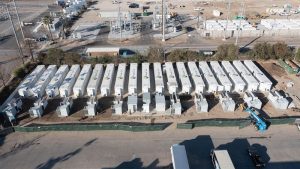
A Virginia-based energy company is proposing to build a 100 megawatt/200 megawatt-hour battery energy storage facility on a Mill Road site just north of West Main Street.
The proposal comes as the Town Board is considering legislation that would regulate battery energy storage systems in Riverhead by designating zoning districts where the facilities would be allowed and setting forth standards for their construction.
A public hearing on the proposed legislation is scheduled to take place tonight at the Town Board meeting, which begins at 6 p.m. at Riverhead Town Hall.
Battery energy storage is not currently a permitted use in any of the town’s zoning districts. The proposed new code would allow “Tier 2” (capacity greater than 600kWh) battery energy storage systems in the Industrial A, Industrial C, Planned Industrial Park, Agricultural Protection, and Residence A-80 zoning use districts, by special permit of the Town Board.
Battery energy storage systems store energy for distribution at a later time. They are often developed to increase the effectiveness of renewable energy production such as solar energy facilities. The systems allow energy from renewables, like solar and wind, to be stored and then released later to meet customer demand.
Hexagon Energy’s limited liability company, Riverhead Energy, proposes to construct the battery energy storage facility on a 3.6-acre site at 95 Mill Road that is in the Residence B-40 zoning use district, though there are pre-existing commercial uses at the site that do not conform to the current zoning.
The Residence B-40 zoning use district is not among the districts in which a facility like the one proposed by Hexagon/Riverhead would be allowed, if the proposed code is passed by the Town Board.
The site of the proposed facility is adjacent to Glenwood Village, a high-density residential development of manufactured homes to the west, the Long Island Railroad track to the south and CubeSmart self-storage to the north.
Hexagon/Riverhead filed a site plan application with the planning department on July 14. It held a pre-submission conference with the planning department last October, according to the application. The company states in the application that it is seeking a zoning change for the site to change a “nonconforming use to a less intensive nonconforming use.”
On July 22, Building and Planning Administrator Jefferson Murphree issued a letter denying the site plan application because it doesn’t comply with existing zoning. Murphee advises the applicant’s lawyer, Phil Butler of Farrell Fritz, to seek a special exception use from the Zoning Board of Appeals, to change from one nonconforming use to another nonconforming use, pursuant to Section 301-222(B) of the town code.
On the same date, planner Matt Charters also issued a letter to the applicant’s lawyer notifying him that the application is considered incomplete and the applicant should submit additional documents, including a sound study, a preliminary equipment specification sheet, a commissioning plan, an operational and maintenance manual and a decommissioning plan.
The application is on the Planning Board’s Aug. 18 agenda for discussion.
Murphree said today the application was put on the agenda, even though it’s already been denied, because it’s a new technology in the town and a discussion by the Planning Board will inform the board about the nature of the application and its proposed use, as well as outline the review process of the application going forward.
The matter is before the Planning Board for review purposes only and no action by the board is recommended or proposed right now, Murphree said. Also, he said, “there is nothing precluding the Planning Board from discussing an application regardless of ‘completeness.’ The application remains incomplete pending the receipt of additional information as outlined within the incomplete letter. Again, we are only trying to be proactive and educate the board and the public on a new use.”
According to Riverhead Energy’s website, the proposed facility will “provide enough energy to power up to 6,750 homes for the next 20 years.”
According to Hexagon Energy’s website, the company, founded in 2015, has 22 solar energy projects currently under development, along with one wind energy project and one battery energy project (in Riverhead.) It has completed four operational solar projects to date.
Hexagon says on the Riverhead Energy website it is partnering with a company called Powin for its expertise in battery hardware and software. Powin has “an extensive (and growing) record of successful deployments and thoughtfully design their storage units to reduce safety risks,” the website says.
The Riverhead site plan depicts Powin Stack750 Centipede modular battery energy storage system consisting of 448 lithium iron phosphate batteries in 16-battery segments and two collection segments for each 16-battery segment. It also depicts a switchyard, which is a facility that transforms voltage and directs electricity flow onto transmission lines. It essentially functions as an electrical substation.
